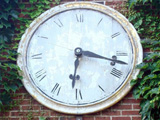Today.Az » Weird / Interesting » 'Time cells' weave events into memories
26 August 2011 [13:20] - Today.Az
 Time is what keeps everything from happening at once, the American theoretical physicist John Wheeler once said. In the mind, as in the outside world, the flow of events contains individual experiences strung together in sequence yet separated by gaps in time. New research shows that during these gaps, neurons in a part of the brain called the hippocampus encode each "empty" moment as precisely as the surrounding events, allowing the brain to make detailed representations of time.
Time is what keeps everything from happening at once, the American theoretical physicist John Wheeler once said. In the mind, as in the outside world, the flow of events contains individual experiences strung together in sequence yet separated by gaps in time. New research shows that during these gaps, neurons in a part of the brain called the hippocampus encode each "empty" moment as precisely as the surrounding events, allowing the brain to make detailed representations of time.
The hippocampus has long been known as a center for navigation and memory. Research into this sea horse-shaped structure shows the importance of "place cells," groups of which fire when a person or animal is at a certain location. The firing pattern provides the neural basis of the mental maps used to find one's way around. But the hippocampus also encodes "episodic" memories of events as they occur in time. Thus, many researchers wondered whether the hippocampus also contains "time cells."
To test the idea, Howard Eichenbaum and colleagues at Boston University trained rats to perform a two-part task with a delay in the middle while fitted with surgically implanted electrodes that recorded neural activity in the hippocampus. The rats were taught to associate an object with an odor: a ball with oregano, for example, and a cube with cinnamon. Then they were presented with one of the objects, after which they entered a chamber for 10 seconds. After this delay, a partition opened, leading to a flowerpot full of scented sand. If the scent paired with the object seen earlier, the rats knew to dig for a food reward. If the odor and object didn't match, the rats refrained from digging. (This correct response was rewarded with a treat in another part of the run.)
As reported online today in Neuron, recordings from some 300 hippocampal neurons showed that during the 10-second delay, about a third of the cells fired did so one after another throughout the delay even though nothing was happening. The researchers surmised that the hippocampus was encoding the passage of time during the empty period, bridging the gap between the two phases of the test.
When the researchers lengthened the delay, although some neurons continued firing at the same time points, others altered their activity as though they were recalibrating to fit the new time duration. The rats' performance did not suffer from the extra down time.
Eichenbaum believes that by having some neurons keep to their accustomed firing pattern, the hippocampus allows the animal to retain its memory of the original conditions, whereas the cells that change are adapting to the new reality. "This is exactly the way place cells behave," Eichenbaum says. "Learning a new spatial layout doesn't mean you forget the old one."
The researchers also found that although there was always a sequential firing pattern during the delay period, it involved slightly different groups of neurons depending on which object was used to start the test. According to Eichenbaum, this finding foreshadows human ability to keep track of evolving, complex situations— changing social landscapes or shifting political loyalties, for example.
"The study shows how we can retain our memory of distinct events while also being aware of time passing in the background," says Wendy Suzuki of New York University. Suzuki recently published a paper in Science showing a similar pattern of hippocampal firing in monkeys trained to touch visual cues on a screen in the same order in which they were previously presented. "We're finding that in the hippocampus, time is just as strongly represented as space."
/Science Now/
|
|